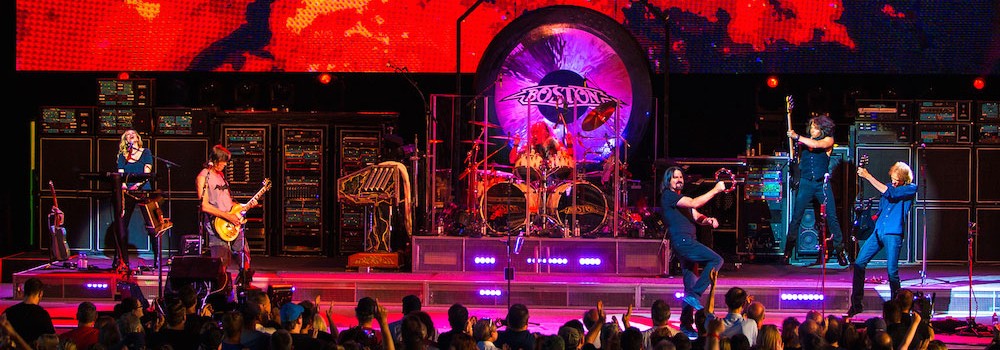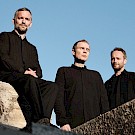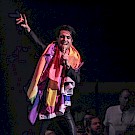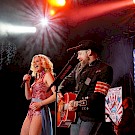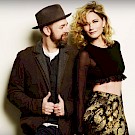Innovators of rock music, Boston are a pillar and sonic style leader of the genre. With their debut record remaining one of the best-selling debut albums in history at 17 million copies, their musical excellence is upheld as an ideal by musicians and fans alike.
“People ask us why we think Boston has been so successful over all these years. Here we are on our 40th anniversary tour: It’s the songs. Somehow they just resonate with people,” shares guitarist Gary Pihl, one of Boston’s longest touring and recording members.
Joining the band of tastemakers in 1985, Pihl has been band founder Tom Scholz’s right-hand man for more than 20 years. During that time, Pihl has undertaken much more than the role of lead guitarist. Assisting in the design and manufacturing of equipment, orchestrating front of house sound, and teaching band performers their parts are just some of the responsibilities he assumes off stage. Credited as “the glue that holds Boston together” by former bandmate Kimberley Dahme, the lifelong musician connected with us while on the road to talk about his start in music, the first time he ever heard Boston, and the evolution of music technology.
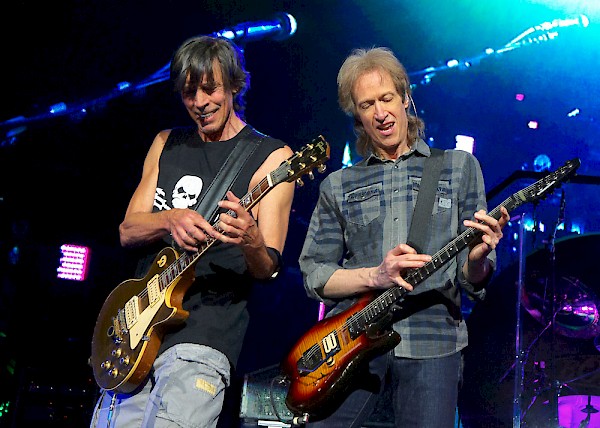 Boston founder Tom Scholz and guitarist Gary Pihl: Photo by Bob SummersWhat got you started in music?
Boston founder Tom Scholz and guitarist Gary Pihl: Photo by Bob SummersWhat got you started in music?
Gary Pihl: Oh boy, you’re really going way back, aren’t you? You know, a lot of my family were musicians. My grandmother played the organ, my cousin played different instruments, my sister took piano lessons. I was always excited to play the electric guitar. I saw guys like The Ventures and people like that and thought to myself, “That’s such a cool sound! I want to play one of those.” By the time I got started, The Beatles had come out, so of course, who didn’t want to be a Beatle, right?
I still want to be one.
[Laughs] Yeah, right? So that got me going. When I was about a sophomore in high school, one of the other guys in my band said, “Hey there’s this guy giving guitar lessons in the next town over. He’s really good. We could all take lessons from him.” So we went down there and took some lessons from him. We even went to see his band play; they were called The Warlocks at the time. About six months later, they changed their name to The Grateful Dead. It was Jerry Garcia giving us lessons.
No way! That is crazy.
Yeah! Lucky I was in the right place at the right time.
Was there anyone in particular in your life that encouraged your talent?
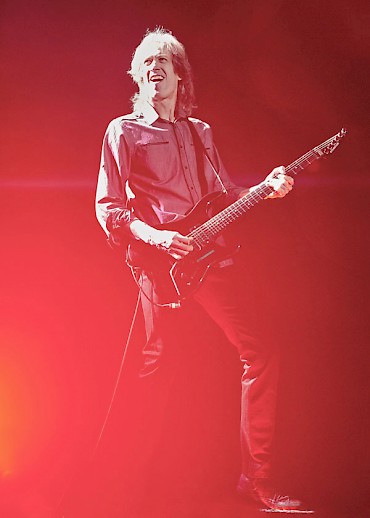 Gary Pihl on tour in 2016I did. I remember my dad saying, “Do whatever you want to do.” This was when I was graduating from high school. He said, “You should go to college.” Then I said, “Well gosh dad, they don’t teach rock and roll in college and that’s all I want to do.” Then he said, “If you like music, you should go to school and learn as much as you can. If you like music, take music classes, but do whatever you can and go to school to learn how.” He drove me over to the local junior college in Santa Rosa, Calif., I enrolled and I loved it. It wasn’t because the teachers were so hip; it was because they were so enthusiastic about the music. I took a bunch of classes there. One of my choral groups, I was sitting next to Johnny Colla who went on to play sax with Huey Lewis and the News. You never know who you’re going to sit next to. That’s always my advice for young musicians saying, “What should I do?” I tell them what worked for me and say, “If you love music, find out all you can about it.”
Gary Pihl on tour in 2016I did. I remember my dad saying, “Do whatever you want to do.” This was when I was graduating from high school. He said, “You should go to college.” Then I said, “Well gosh dad, they don’t teach rock and roll in college and that’s all I want to do.” Then he said, “If you like music, you should go to school and learn as much as you can. If you like music, take music classes, but do whatever you can and go to school to learn how.” He drove me over to the local junior college in Santa Rosa, Calif., I enrolled and I loved it. It wasn’t because the teachers were so hip; it was because they were so enthusiastic about the music. I took a bunch of classes there. One of my choral groups, I was sitting next to Johnny Colla who went on to play sax with Huey Lewis and the News. You never know who you’re going to sit next to. That’s always my advice for young musicians saying, “What should I do?” I tell them what worked for me and say, “If you love music, find out all you can about it.”
Years later, I asked him, “Dad, did you ever want me to do something else besides being a musician?” And he said, “Well, it would have been nice if you could have been a corporate lawyer.” And I said, “You never even mentioned that to me!” He just said, “Well, I didn’t want to. You wanted to do what you wanted to do.” I was very grateful for that.
You played in a number of bands before joining Sammy Hagar and later Boston. What were some of the highs and lows that shaped your perspective on music?
I could say that things were different in those days. I’m kind of the baby boomer generation. The Beatles came out and our generation had a lot of disposable income because there weren’t a lot of other distractions. When we were in high school, you would know all of the Top 40 songs and the members of the band. There were nightclubs where you could see music, but also a lot of places where you could go and see bands if you were not 21 or even 18. There were school dances and bands would play at the roller rink, they would play music after skating. Music was a big part of our lives because there weren’t distractions like video games. It was just a different time. I was lucky in that I grew up in that time where you could be in a band and actually make money doing it. You could play at the YMCA this week and then someplace else another week, private parties and those sorts of things. It seems more difficult for bands these days. Then of course there’s the whole record industry that was different—like Boston’s first album sold 17 million records, but that’s just unheard of these days. It’s just a different world.
Do you remember the first time you heard Boston?
Absolutely! I was driving down the road in my hometown. Pulled up to a red light, and this guy in the car behind me jumps out of his car and runs up to mine. I recognized who it was and he said, “Quick! Turn on the radio, this is the band I was telling you about! They’re called Boston, check this out!” I turn it out and it’s “More Than A Feeling.” I think, “Wow! What a sound that is.” Even on my tiny radio, it just sounded fantastic. I definitely remember where I was. At the time, I was in a cover band, and we started playing that song. A few months later, I got the opportunity to audition for Sammy Hagar’s band. Got the gig. One of the first things we did, was we got to open up for the end of Boston’s first tour in ’77. They liked us and we liked them, so they said, “You guys should come open for our entire second tour.” That’s just what we did. From ’78 to ’79, we toured all around the country as the opening act for Boston. So I’ve been on every Boston tour, but in the first two, I was in the opening act.
When did you first meet Tom Scholz? What was your first impression?
Well in ’77, we had the chance to open for them. We knew that Tom was an electronic genius and that he recorded that first album in his basement. That was just unheard of! Bands just didn’t do that. The general wisdom at the time was that you had to go into an expensive recording studio to make a professional recording. Nobody had that stuff at home. The equipment was very expensive. He bought the equipment, it took him four years to make that first record. Whatever it was, he got it right! So I knew that about him, and when I saw their stage set up and their equipment, I was always into electronics myself so I started asking him questions like, “Hey, what’s this here? How do you get that sound?” And he could see that we both had that same interest. He was kind enough to tell me about some of the things that he had done and built, and how stuff worked, and how he got some of those sounds live. He was very generous with his time and information to me.
We kept in touch over the years and so when Sammy [Hagar] got the call in 1985 to join Van Halen, Tom called and asked if, at that point, I would come play on one more song for the third album. I left from my last gig with Sammy, which was Farm Aid out in Illinois, flew directly to Boston to start working with Tom. After about six weeks, he said, “Why don’t you move out here and we’ll finish this album, we’ll go on tour and who knows what next.” I wasn’t out of work for a day. How lucky could a guy get? I’ve been very fortunate.
 Boston’s lineup has changed over the years. What is it like bringing in new members?
Boston’s lineup has changed over the years. What is it like bringing in new members?
We get recommendations from other people and hear what people have done. They’re not unknown to us. We know the person is really good and it is worth trying them out. I really think the lineup we have now is one of our best. That’s what people have been telling us. Fans that have been to see us multiple times over the years will tell us. I certainly agree. All the folks are terrific to work with. And of course the technology has improved every year. We’re still using the same guitars and amplifiers that Tom designed, which is unique as well. We’re one of the only bands in the world that can say that we play with the amplifiers that we built. The sound systems always improve. The best stereo system ever for going to a concert.
I read a quote from Tom in your bio, speaking to everything you do in the band, saying, “I’d be lost without him.” Besides lead guitarist, what are some of the roles you play in Boston that might not be obvious to fans?
When I joined Tom in ’85, he also had his electronics company, called Scholz Research & Development, and Rockman, which was his main product. Like other music equipment manufacturers, they would go to trade shows to demonstrate their products for music store owners and buyers to see what new products were coming out.
When I first moved back there, they were getting ready to go to a trade show and Tom said, “You should come down to the factory here. We’re working on some new equipment, you should take a listen to it and tell us what you think.” All the other engineers are musicians as well, so we’re all guitar players making suggestions. Tom says, “We’re going to change part of the circuitry.” The guys start soldering away and I say, “Well look, I know how to solder. Let me help.” So I just ended up going to the office everyday and working on the gear. There’s nobody that knows the gear better than Tom and me because we actually built it and know how it works. Our crew guys are sometimes not as familiar with our equipment as we are. My other hobby has always been photography and graphic design. These days, I help out with the website as well.
On the topic of equipment, on the inside sleeve of Don’t Look Back, it said, “No Synthesizers Used. No Computers Used.” It really speaks to the idea that the guitar is a more powerful tool than people sometimes assume. After the debut album, many bands were adopting elements of Boston’s sound, using synthesizers. What are your thoughts on technology making it a lot easier to mimic and copy sounds? Do you think there is room for your approach to make a comeback?
When you say copy sounds, that leads me to think of sampling. You record someone else’s recording and use a bit of that in your own. That’s kind of cheating. That’s frowned upon by usually just about everyone. The other side of it, the technology, I’ll give you an example of what they call modeling. In the ‘50s and ‘60s, you had a guitar and an amplifier and that amplifier had tubes in it. It was state of the art at the time. It had a certain sound to it. As technology improved, in the quest to make things smaller and less expensive, transistors started replacing tubes. It’ll be smaller, lighter, louder, so therefore it’ll be better. That didn’t seem to be the case. Most guitar players said, “Maybe it’s lighter and cheaper to make but it doesn’t sound any better. I still like the old tube amp.” Most guitar players these days want to use the old tube amps. Those have certainly made a comeback. There are boutique amplifier companies that specialize in old-style, tube amps. That’s still there, which is nice to see.
The technology now is to a point where you can model, record what the sound is coming from the tube amp, and simulate it using computers so that, supposedly, you get the sound of this tube amp with your computer. You might be thinking, “What’s the difference, why don’t you just use the tube amp then?” Instead of going to all the trouble of modeling it with another device. The thought is, you could do that with 100 different amplifiers. You may like the sound of a Marshall amp, a Fender amp, a Gibson and a Vox. Now, if I model them, I can step on a food switch and switch from the sound of a Marshal to a Vox amp. It certainly opens up a lot of possibilities, hundreds of different amp sounds all with just one amp. They’re still working on that. In my mind, they still haven’t quite perfected that, but that’s where some of the technology is going.
Do you find that longtime Boston fans are receptive to new music or experimenting with your sound?
It seems like a bit of both. When Boston’s last album came out a couple years ago, fans would bring copies of that to the shows. They certainly seem to like them. But classic rock radio, of course, plays mostly songs from the first three albums. That’s what people are more familiar with. When we perform live, we’ll do all the songs that people want to hear from the first three albums, but we’ll also throw in some songs from the new albums as well and people seem to like those. One of the longer songs that we do in the set is from the fourth album called “Walk On.” I enjoy playing that song a lot. It’s kind of a difficult song to play, but we extend it when we play it live so that everybody has a chance to improvise when they’re on stage. You never know what you’re going to get that night! Somebody could take it off in a different direction. The audience seems to like that, too. It’s nice that the audience has been receptive.
You’ve played for countless arenas packed with people over the years. How do you know when you’ve connected with an audience?
You can just feel it in the air. You can hear them cheering, which is always nice. That’s the special thing about live performance. It’s not just a movie screen where you could go see a concert filmed. That’s one experience. But to actually be there and see the band, that interaction of people inspires you even further. That feedback only exists in live performance.
What do you think has kept Boston together over the years?
People ask us why we think Boston has been so successful over all these years. Here we are on our 40th anniversary tour: It’s the songs. Somehow they just resonate with people. There is no better feeling for me standing up on stage, playing these songs, than looking out at the audience, young and old, singing along and smiling. That’s just the greatest feeling ever.
What can listeners look forward to at the Portland show?
We’ll be playing a lot of the songs from the first album since it’s the 40th anniversary. We’ll be playing some deep cuts from the other albums that we either don’t play very often or people have written in requesting, a few from the latest album. Definitely something for everybody.

